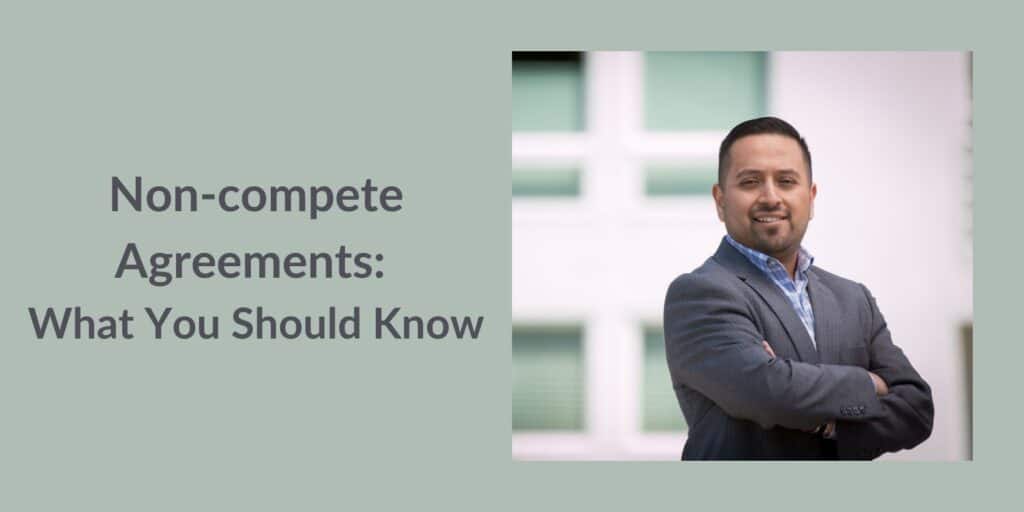Estimated reading time: 5 minutes
Business owners are aware that employees often leave and go work for a competitor.
Because of this, employers sometimes use non-compete agreements to help protect against employees sharing client lists, divulging trade secrets, or insider information to a competitor.
When employees leave an organization, they can create a competitive advantage by divulging confidential information about the former employer’s business practices, client lists, or trade secrets to a competitor.
Trade secrets are anything that makes the business unique.
For example, a trade secret could be a method of doing something, a technique, a business process, or a program that has some level of economic value.
What is the goal of a non-compete agreement?
The goal of a non-compete agreement is to keep an employee from taking the information they had access to or learned from a competing business to a new employer.
Noncompete agreements need to be balanced to protect both the employer as well as the employee.
It does not make sense to have such tight limitations that employees are banned from performing the work they were trained to do.
At the same time, an employee should not be able to go to a competitor and give them an unfair advantage because an employee walks out the door with client lists, information about the internal workings of the organization, or confidential trade secrets.
There needs to be a balance between protecting the employer and the employee’s right to make a living.
Are Non-Compete Agreements Enforceable?
For non-compete agreements to be enforceable, they need to have reasonable geographic and time period limitations.
The agreement should also have a clear business purpose and not limit an employee’s ability to find employment.
To determine if a non-compete agreement is enforceable, the following questions should be answered:
- Does the agreement impose an undue hardship on the employee?
- Is it injurious to the public interest?
- Is the restriction greater than necessary to protect the legitimate interest of the employer?
- Does the employer have a business interest to protect?
Think of this scenario.
You are a small business owner who makes beeswax candles.
You have created a streamlined process that allows you to produce candles at twice the rate of competitors.
Because of this streamlined process, you have lower production costs and can manufacture less expensive candles. That is your competitive advantage!
If an employee takes this process to a competitor, it creates an unfair advantage for your competitor.
It simply is not fair that you spent the time and resources in creating the process that was duplicated. They can now hit the ground running and unfairly compete with you.
This might be an example of a time when a non-compete agreement would be appropriate.
Not All States Recognize Non-Compete Agreements
Some states do not recognize noncompete agreements. It is important to understand the laws in your state and create agreements that can be supported by state law.
So, what happens if a non-compete agreement is enforceable and an employee ignores their agreement?
This is not a good thing for the employee or the hiring employer.
There have been cases where the former employer won litigation and was awarded damages based on profits due to violating the agreement.
The award included compensatory damages as well as attorney fees.
No one wants to waste time and resources in court. Again, the goal is a reasonable agreement that protects both the employer and the employee.
What is the time limit on noncompete agreements?
One year is the most common time limit on noncompete agreements. But you will see time limits of six months to two years.
Again, the goal is to have reasonable expectations for a departing employee. So, depending on your industry, a timeline can communicate your attempt at reasonable restrictions.
What is the typical distance for a non-compete?
The distance from your business location can vary. A common distance is that employees are prohibited from competitive activity within a 10 to 25-mile radius of the employer’s business.
Be Aware of Who You Are Hiring
For this reason, hiring employers should be aware of noncompete agreements from prior employers before making a hiring decision.
If a non-compete agreement is reasonable with its limitations and written to protect the employer’s confidential information and or/trade secrets, it is much more likely to be enforceable than the one targeted to limit competition.
Attorneys Are an Important Part of The Process
Every state has different laws on non-compete agreements, so it is important to have an attorney look at an agreement to ensure it is enforceable and complies with local laws.
Many online tools can help you create a customized agreement that complies with the laws of your state.
This investment will be worth the time and effort.
Everyone wants fair treatment.
Employees need to be able to make a living. However, a business that invests time and money in fine-tuning how they do what they do should have some protection from employees who have selfish motives.
Take the time to learn what your state laws are and work to create an agreement that can benefit both you and your departing employees.
If you are interested in learning more, you can check out this book – How to Create a Noncompete Agreement to learn more.
